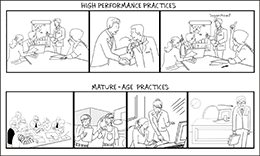11 January 2017
 Australian employers desperately need to harness the power of their older workers in order to boost the economy and with tens of thousands of employees this year receiving the birthday present of an extra six months of work before being eligible for the pension, finding ways to keep older workers engaged is essential.
Australian employers desperately need to harness the power of their older workers in order to boost the economy and with tens of thousands of employees this year receiving the birthday present of an extra six months of work before being eligible for the pension, finding ways to keep older workers engaged is essential.
Mature-age workers currently account for 40 per cent of the total Australian workforce and according to latest Australian Bureau of Statistics figures more than four million Australian workers are aged 45 years or older.
A recently published University of South Australia study shows employers who address and invest in older workers reap significant benefits including a committed, stable and engaged workforce but that many are far from up to the challenge.
Research Professor in Human Resource Management at the University of South Australia’s Centre for Workplace Excellence, Professor Carol Kulik, was the lead researcher on the “Engage Me: The Mature-Age Worker and Stereotype Threat” article published in the December/January edition of the Academy of Management Journal.
"Age stereotypes are notoriously persistent in organisations with mature-age employees commonly perceived to be less productive than their younger counterparts, lacking initiative, disinterested in learning or developing, and resistant to change,” Prof Kulik says.
“Mature-age employees are aware of these age stereotypes and worry that they may inadvertently confirm them. The resulting stereotype threat demotivates mature-age workers and lowers their engagement.
“Our research shows that employers who address older workers’ concerns while also investing in training actually reap significant benefits including a committed, stable and engaged workforce.
"Unfortunately, organisations have been slow to adopt mature-age practices, even though our research shows them to be highly effective in reducing stereotype threat and increasing job engagement among older workers.”
Prof Kulik and her UniSA colleague Sanjeewa Perera together with Christina Cregan from the University of Melbourne, found mature-age workers reported lower stereotype threat and higher engagement when their employer had high performance practices that focused on employee training, rewards, and participation; or had adopted mature-age practices that focused on age-specific training, job design and career management opportunities.
The high performance and mature-age practices had independent effects, so workers were most engaged when their organisations invested in both types of practices.
The practices were especially important when mature-age workers reported to young managers, were surrounded by young co-workers or worked in manual occupations where age-related physical declines could be visible.
“Employers and managers need to be aware of the unintended signals that environmental cues send to mature-age workers,” Prof Kulik says.
"Policies crafted to recognise and encourage mature-age workers send consistent, durable signals that lessen those workers’ concerns about negative managerial attitudes and increase their focus on their work.
“Organisations can try to eliminate age stereotypes, but managerial attitudes are stubbornly resistant to change so focusing on management practices may have more immediate – and more enduring – effects on mature-age worker engagement.
“Organisations will enjoy the highest levels of engagement from their mature-age workers when they add age-specific practices to their management practices including training designed to upgrade mature-age worker skills, opportunities to redesign jobs to accommodate mature-age worker needs, and phased retirement programs that allow mature-age workers to ease into retirement.”
Engage Me: The Mature-Age Worker and Stereotype Threat
Carol T. Kulik, Sanjeewa Perera, and Christina Cregan
ACAD MANAGE J December 2016 59:6 2132-2156
There is a brief video that outlines the “Engage Me: The Mature-Age Worker and Stereotype Threat” research.
Media Contact: Katrina McLachlan office (08) 8302 0961 email katrina.mclachlan@unisa.edu.au mobile 0414972537


